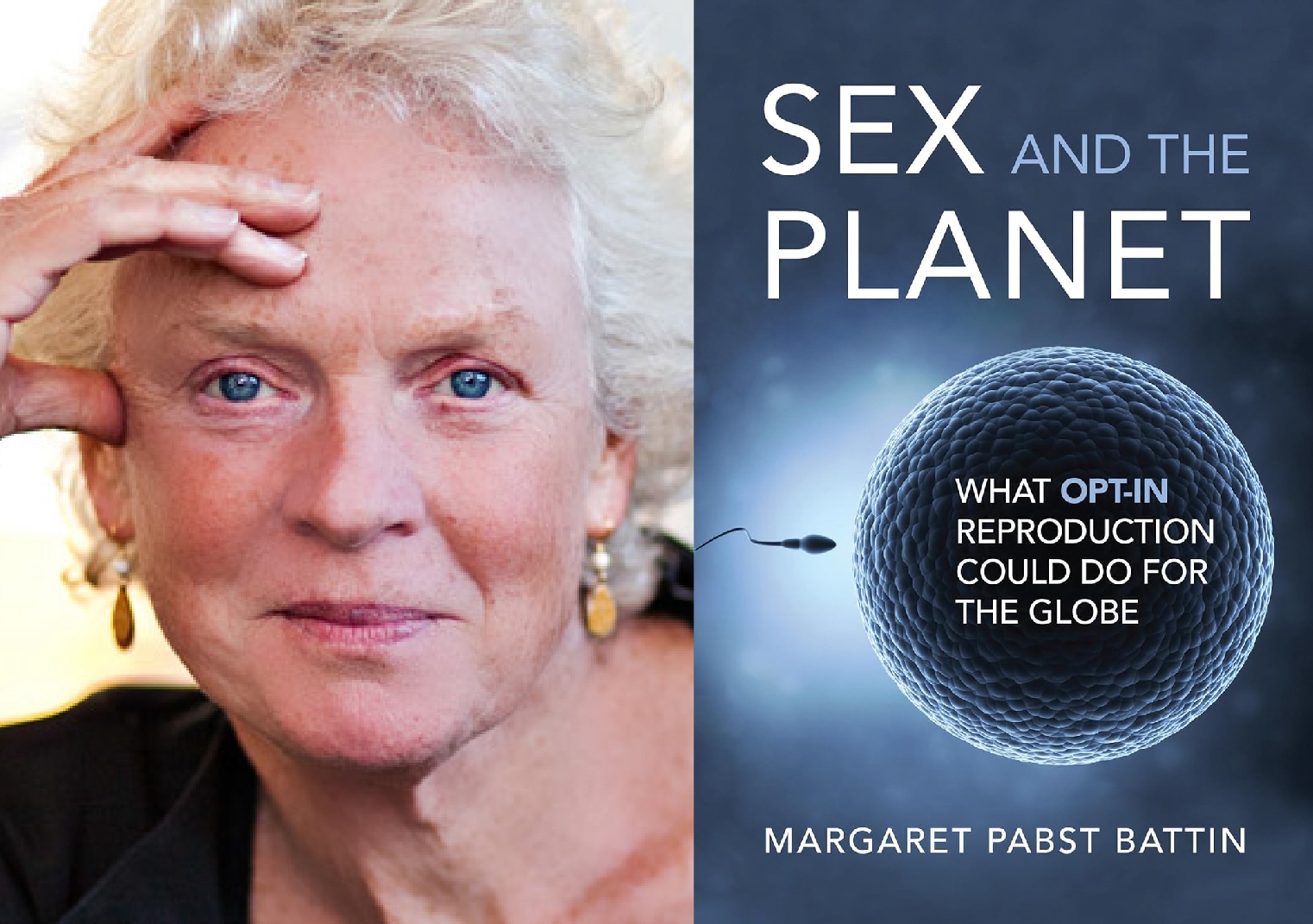Distinguished Professor Peggy Battin discusses new book about “opt-in reproduction” and medical ethics
Robert Carson — Associate Director, Tanner Humanities Center — November 15, 2024
What if advances in technology were already changing the causal logic of human reproduction which is now taken for granted? Could pregnancy shift from an event which some opt out of through prevention or termination, to an intentional, elective choice? How should such a system work, and what would be its likely consequences?
These questions comprise the “opt-in conjecture” by University of Utah Distinguished Professor of Philosophy Margaret Pabst Battin, whose book, Sex and the Planet: What Opt-In Reproduction Could Do for the Globe was published by MIT Press this year. Battin, who goes by Peggy, discussed her work with David Turok (Obstetrics and Gynecology) and James Tabery (Philosophy) in a Tanner Talk on November 7. In her book and her discussion, Battin explores the philosophical and ethical implications of long-acting reversible contraception (LARC).
LARC exists in various forms, such as sub-dermal implants and intra-uterine devices in women, and some vasectomy procedures in men. In contrast to other forms of contraception like the birth control pill or the condom, LARC allows for a “set it and forget it” approach. In doing so, LARC enables a higher degree of individual autonomy and effectiveness. While current LARC methods have room for improvement, their declining costs and technological refinements compel us, Battin argues, to consider their full potential. In this way, Battin invites scholars and the public to develop philosophical judgement as a matter of urgent public relevance, in contrast to the thought exercises of many other philosophical conjectures.
Battin begins by identifying a range of challenges that arise from unintended pregnancies, such as abortion, adolescent pregnancy, high-risk pregnancies, sexual violence, and fluctuating population trends. These contentious phenomena all trace back, in her view, to the context in which conception itself occurs. She argues that by drastically reducing unintended pregnancies using current and to-be-developed LARC, these issues could be mitigated in significant ways—but only if certain conditions forming the ethical basis of “opt-in conjecture” can be guaranteed: LARC must be entirely voluntary; it must be available universally without targeting specific populations or demographics; and it must be instantly and safely reversible on demand, either clinically or independently. Battin suggests that this comprehensive, ethical implementation of LARC’s potential can reframe or directly solve several pressing social conflicts around reproduction.
In his response, Tabery situated Battin’s ideas in the longer history of sterilization programs in the United States, particularly focusing on eugenic practices that targeted people deemed “unfit”—often poor people, people with disabilities, and racial minorities. In particular, he discussed the local history of sterilization in Utah, in which 800-900 people were sterilized in the early 20th century. A particularly revealing University of Utah masters thesis by George Heber Sears in 1933 highlighted how Utah’s medical and religious authorities often dismissed reports of sexual abuse and instead opted for forced sterilization as a solution to the problem of undesired pregnancy. Tabery’s remarks point to the necessity of the voluntary aspect of Battin’s conjecture, by illustrating a moment of its institutional lapse. The cases in Sears’s thesis demonstrate how reproductive control measures, when not truly voluntary, can compound rather than alleviate vulnerability.
In the discussion of his clinical work and research, Turok explained how the ethical norms of Battin’s conjecture also guide the practice of reproductive justice, in which patient autonomy, informed consent, and rights to full sexual expression underpin health care delivery. As an example of the reproductive justice framework in action, the HER Salt Lake Contraceptive Initiative by Turok and his colleagues demonstrated how removing barriers to access and supporting patient choice leads to better outcomes than simply promoting specific long-acting contraceptive methods alone. In this way, their work focuses on systemic changes and patient-centered care, rather than technological solutions which do not address their underlying social and institutional contexts. Turok’s perspective suggests that while Battin’s opt-in conjecture presents an ideal endpoint, its realization requires addressing current inequities in healthcare delivery and access.
Together, Battin, Turok, and Tabery’s conversation illuminates the ongoing tension between political or philosophical ideals, on one hand, and socially-embedded institutional practices, on the other. Most broadly, Battin’s opt-in conjecture posits a new development in the human right to self-determination, while stipulating the necessary conditions for the exercise of that right. The Tanner Talk discussion shows the difficult tensions between philosophy, policy, and history in the development of rights and liberties, more generally. Furthermore, Battin’s book comes at a pivotal moment in public debates about sex, reproduction, and family life—from the Dobbs v. Jackson decision by the United States Supreme Court, to new natalist policies in Hungary and elsewhere, to projected population decline in Japan and South Korea.
In addition to her appointment as Distinguished Professor of Philosophy, Peggy Battin is also Adjunct Professor of Internal Medicine at the University of Utah’s Center for Health Ethics, Arts and Humanities. She has received both the Distinguished Research Award (1997) and the University of Utah’s most prestigious award, the Rosenblatt Prize (2000). She has authored or edited more than twenty books, spanning topics from suicide and end-of-life issues to bioethics and reproductive rights. Battin’s scholarly achievements have earned her recognition as one of the “Mothers of Bioethics.”

